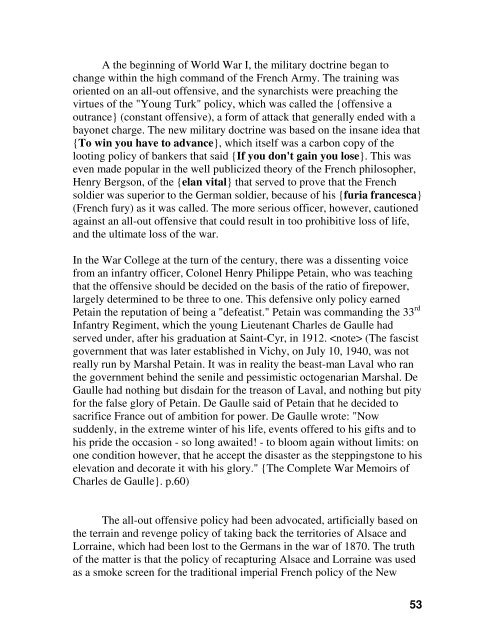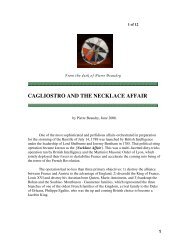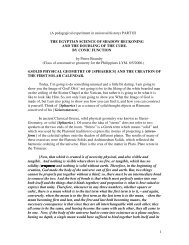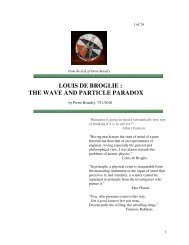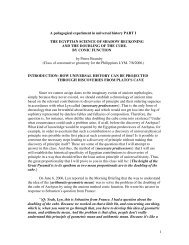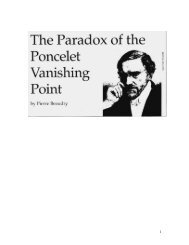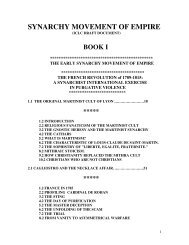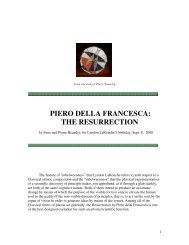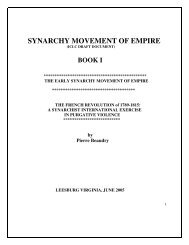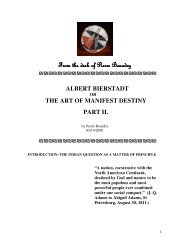synarchy movement of empire book ii - Pierre Beaudry's Galactic ...
synarchy movement of empire book ii - Pierre Beaudry's Galactic ...
synarchy movement of empire book ii - Pierre Beaudry's Galactic ...
You also want an ePaper? Increase the reach of your titles
YUMPU automatically turns print PDFs into web optimized ePapers that Google loves.
A the beginning <strong>of</strong> World War I, the military doctrine began to<br />
change within the high command <strong>of</strong> the French Army. The training was<br />
oriented on an all-out <strong>of</strong>fensive, and the synarchists were preaching the<br />
virtues <strong>of</strong> the "Young Turk" policy, which was called the {<strong>of</strong>fensive a<br />
outrance} (constant <strong>of</strong>fensive), a form <strong>of</strong> attack that generally ended with a<br />
bayonet charge. The new military doctrine was based on the insane idea that<br />
{To win you have to advance}, which itself was a carbon copy <strong>of</strong> the<br />
looting policy <strong>of</strong> bankers that said {If you don't gain you lose}. This was<br />
even made popular in the well publicized theory <strong>of</strong> the French philosopher,<br />
Henry Bergson, <strong>of</strong> the {elan vital} that served to prove that the French<br />
soldier was superior to the German soldier, because <strong>of</strong> his {furia francesca}<br />
(French fury) as it was called. The more serious <strong>of</strong>ficer, however, cautioned<br />
against an all-out <strong>of</strong>fensive that could result in too prohibitive loss <strong>of</strong> life,<br />
and the ultimate loss <strong>of</strong> the war.<br />
In the War College at the turn <strong>of</strong> the century, there was a dissenting voice<br />
from an infantry <strong>of</strong>ficer, Colonel Henry Philippe Petain, who was teaching<br />
that the <strong>of</strong>fensive should be decided on the basis <strong>of</strong> the ratio <strong>of</strong> firepower,<br />
largely determined to be three to one. This defensive only policy earned<br />
Petain the reputation <strong>of</strong> being a "defeatist." Petain was commanding the 33 rd<br />
Infantry Regiment, which the young Lieutenant Charles de Gaulle had<br />
served under, after his graduation at Saint-Cyr, in 1912. (The fascist<br />
government that was later established in Vichy, on July 10, 1940, was not<br />
really run by Marshal Petain. It was in reality the beast-man Laval who ran<br />
the government behind the senile and pessimistic octogenarian Marshal. De<br />
Gaulle had nothing but disdain for the treason <strong>of</strong> Laval, and nothing but pity<br />
for the false glory <strong>of</strong> Petain. De Gaulle said <strong>of</strong> Petain that he decided to<br />
sacrifice France out <strong>of</strong> ambition for power. De Gaulle wrote: "Now<br />
suddenly, in the extreme winter <strong>of</strong> his life, events <strong>of</strong>fered to his gifts and to<br />
his pride the occasion - so long awaited! - to bloom again without limits: on<br />
one condition however, that he accept the disaster as the steppingstone to his<br />
elevation and decorate it with his glory." {The Complete War Memoirs <strong>of</strong><br />
Charles de Gaulle}. p.60)<br />
The all-out <strong>of</strong>fensive policy had been advocated, artificially based on<br />
the terrain and revenge policy <strong>of</strong> taking back the territories <strong>of</strong> Alsace and<br />
Lorraine, which had been lost to the Germans in the war <strong>of</strong> 1870. The truth<br />
<strong>of</strong> the matter is that the policy <strong>of</strong> recapturing Alsace and Lorraine was used<br />
as a smoke screen for the traditional imperial French policy <strong>of</strong> the New<br />
53


